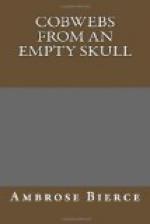“The interest you both take in me,” said the wolf, without looking up, “touches me deeply. As you have considerately abstained from bothering me with the question of how I am to be disposed of, I will not embarrass your counsels by obtruding a preference. Whatever may be your decision, you may count on my acquiescence; my countenance alone ought to convince you of the meek docility of my character. I never lose my temper, and I never swear; but, by the stomach of the Prophet! if either one of you domestic animals is in sight when I have finished the conquest of these ribs, the question of my fate may be postponed for future debate, without detriment to any important interest.”
This fable teaches that while you are considering the abatement of a nuisance, it is important to know which nuisance is the more likely to be abated.
XXIX.
A snake tried to shed his skin by pulling it off over his head, but, being unable to do so, was advised by a woodman to slip out of it in the usual way.
“But,” said the serpent, “this is the way you do it!”
“True,” exclaimed the woodman, holding out the hem of his tunic; “but you will observe that my skin is brief and open. If you desire one like that, I think I can assist you.”
So saying, he chopped off about a cubit of the snake’s tail.
XXX.
An oyster who had got a large pebble between the valves of his shell, and was unable to get it out, was lamenting his sad fate, when—the tide being out—a monkey ran to him, and began making an examination.
“You appear,” said the monkey, “to have got something else in here, too. I think I’d better remove that first.”
With this he inserted his paw, and scooped out the animal’s essential part.
“Now,” said he, eating the portion he had removed, “I think you will be able to manage the pebble yourself.”
To apprehend the lesson of this fable one must have some experience of the law.
XXXI.
An old fox and her two cubs were pursued by dogs, when one of the cubs got a thorn in his foot, and could go no farther. Setting the other to watch for the pursuers, the mother proceeded, with much tender solicitude, to extract the thorn. Just as she had done so, the sentinel gave the alarm.
“How near are they?” asked the mother.
“Close by, in the next field,” was the answer.
“The deuce they are!” was the hasty rejoinder. “However, I presume they will be content with a single fox.”
And shoving the thorn earnestly back into the wounded foot, this excellent parent took to her heels.
This fable proves that humanity does not happen to enjoy a monopoly of paternal affection.




